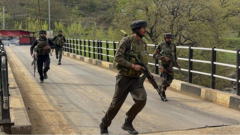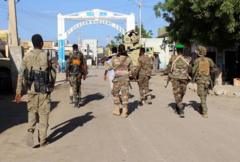A terrorist attack in Kashmir has resulted in significant casualties, marking the area’s worst violence in years and intensifying age-old disputes between India and Pakistan over the territory, which has been a contentious issue since the 1947 partition.
Kashmir Violence Resurfaces Amidst Longstanding Tensions Between India and Pakistan

Kashmir Violence Resurfaces Amidst Longstanding Tensions Between India and Pakistan
The recent attack in Kashmir, resulting in the deaths of 26 tourists, has reignited fears of escalating conflict in the already volatile region.
On Tuesday, militants in Kashmir executed a deadly attack, leaving at least 26 tourists dead and many others injured, marking one of the most devastating assaults on civilians in the Indian-controlled area in recent years. Indian authorities have described the incident as a terrorist act, but no group has yet taken responsibility. Historically, India has pointed fingers at Pakistan for such attacks, with a notable incident in 2019 that nearly sparked war between the two nations.
Understanding the complexity of the Kashmir issue requires delving into its historical context. The picturesque valley is situated in the Himalayan mountains and is known for its ethnic diversity. Its status as a disputed territory was solidified in 1947 during the partition of British India into the separate nations of India and Pakistan. While Pakistan emerged as a Muslim-majority country, India retained its Hindu roots.
Initially, the Hindu ruler of Kashmir hesitated to join either nation. However, after a short time, he decided to accede to India, triggering military involvement from both countries. Consequently, Kashmir was divided, with Pakistan controlling approximately one-third and India holding the remaining two-thirds, a division that has since fomented conflict and violence for decades. The recent attack is likely to exacerbate these tensions and reignite debates over the region's future.





















